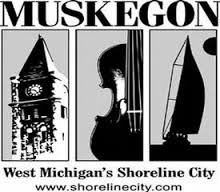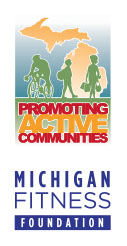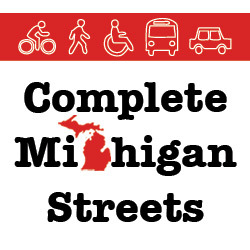You are currently browsing the category archive for the ‘News’ category.

Don’t miss the next Prosperity Agenda focused on Complete Streets in Michigan. Listen here today or tune in at 7 p.m. tomorrow, June 25th, for those who get NewsTalk 760 WJR Radio.
Dan Gilmartin of the Michigan Municipal League and co-host Dustin Block, news director for MLive Detroit, talk about Complete Streets and how these projects are taking hold in Michigan and transforming our communities with guests Suzanne Schulz, Planning Department Director for the City of Grand Rapids, Economic Development Program Manager for the Woodward Avenue Action Association, Jason Fowler, and John Lindenmayer, Advocacy and Policy Director for the League of Michigan Bicyclists and co chair of the Michigan Complete Streets Coalition.
The Healthy Environments Partnership and the Detroit Food & Fitness Collaborative Present the 2nd Round of Active Living Detroit Mini-Grants
The Active Living Detroit Mini-Grant program engages Detroiters in promoting activity friendly environments throughout Detroit. Mini-grants of up to $1000 will fund community projects aimed at promoting physical activity and environments that support active living and physical health.
Priority will be given to projects that:
- Engage community residents, particularly youth;
- Support complete streets concepts and implementation; and
- Incorporate Detroit Greenways.
Mini-grant dollars can be used for sustainable projects such as walking groups that bring local residents together for physical activity, fitness clubs organized at community centers, or efforts to improve street safety for bikers and pedestrians.
Application deadline: Wednesday, July 10, 2013
Application materials are also available on the Healthy Environments Partnership website: www.hepdetroit.org
If you have questions about submitting an application please contact:
Julia Weinert
734-763-0741
[email protected]
 Guest Post by Nancy Krupiarz, Michigan Trails and Greenways Executive Director
Guest Post by Nancy Krupiarz, Michigan Trails and Greenways Executive Director
More than 150 people attended two forums on May 29-30th to learn about Complete Streets and the impact it could have on quality of life for the City of Muskegon and its surrounding communities. Within the two forums there were engineers, health professionals, planners, road commissioners, elected officials, and business and community leaders as well as members of the general public. An early indicator for success was the fact that key partners that would be essential to a successful Complete Streets effort were involved early on in putting these events together. The partners included: West Michigan Shoreline Regional Development Commission, Disability Connection/West Michigan, County of Muskegon Public Health Department and CVB, Community Foundation for Muskegon County, and One in 21 – Healthy Muskegon County, an initiative of the Muskegon Rotary Club.
Steven Buchtel, Executive Director of Trails for Illinois and a former planner with the Active Transportation Alliance, presented on the triple bottom line that Complete Streets brings to a community – people, place, and profit. He also talked about the low-cost infrastructure changes, primarily through the use of paint, that is the “low hanging fruit” of implementing a Complete Streets plan.
Jason Bell, Zoning Administrator for Blue Island, Illinois and a principle of Bare Knuckle Planning, Inc., talked about the process they went through in putting together a policy that would end up ranking third in the nation by the National Complete Streets Coalition. He also emphasized the importance of the Cal-Sag Trail and the impetus it gave to the City to make Complete Streets connections.
Deb Alfonso from the Intermodal Policy Unit of Michigan Department of Transportation, talked about the Michigan Complete Streets law and how MDOT will work with communities with local Complete Streets policies.
Nancy Krupiarz, Michigan Trails and Greenways Executive Director, detailed some of the studies that illustrate the positive benefits that Complete Streets brings to a community and the difference between the types of policies that can be adopted.
Overall, the concept of Complete Streets seemed to be very well received among all the attendees and the county seems poised and ready to take the next steps towards getting a policy in place and implementation on the ground!
 Bikeable and walkable communities provide safe and active opportunities for transportation. Use the Promoting Active Communities (PAC) program to assess your community’s active living infrastructure and implementation. New in 2013, your community will receive a Complete Streets Score; use the PAC assessment to evaluate your community’s current Complete Streets initiatives and receive feedback on ways to improve the safety and accessibility of your roads. Complete the PAC assessment and see where your community’s active living policies, programs and built environments rank among like-sized Michigan communities.
Bikeable and walkable communities provide safe and active opportunities for transportation. Use the Promoting Active Communities (PAC) program to assess your community’s active living infrastructure and implementation. New in 2013, your community will receive a Complete Streets Score; use the PAC assessment to evaluate your community’s current Complete Streets initiatives and receive feedback on ways to improve the safety and accessibility of your roads. Complete the PAC assessment and see where your community’s active living policies, programs and built environments rank among like-sized Michigan communities.
- Please visit the PAC Web site, www.mihealthtools.org/communities, to register by June 15th, 2013
- Use the free online assessment to help you evaluate local policies, programs, and the built environment to identify ways to promote and support active living.
- Complete the PAC assessment by July 15, 2013
- Upon completing the assessment, receive a personalized feedback report to help you identify strategies to create a more active places and spaces in your community.
- Your community will receive an award, showcasing your efforts to design pedestrian and bike-friendly neighborhoods.
Join the 144 Michigan communities from 57 counties who have already used the PAC program and are integrating active lifestyles into the statewide culture. For more information, visit www.mihealthtools.org/communities. Be a part of the growing movement to make Michigan a healthier, more prosperous place to live, work, learn and play!
On May 22nd, Governor Rick Snyder made the following appointments to the Complete Streets Advisory Council:
- Lynn Afendoulis, of Grand Rapids, is director of corporate communications for Universal Forest Products Inc., where she oversees public and investor relations, internal and executive communications and community affairs. She will represent the State Transportation Commission and replaces Linda Miller-Atkinson.
- Rob Bacigalupi, of Traverse City, is deputy director of the Traverse City Downtown Development Authority, a position he has held since 1998. Bacigalupi will represent public transit users and replaces Kelli Kavanaugh.
- Karen Kafantaris, of Grand Ledge, is associate state director of AARP Michigan, where she has worked since 2001. She is reappointed, and will continue to represent AARP.
Appointees will serve three-year terms that expire Sept. 30, 2015.
 The Road Commission for Oakland County (RCOC) Board of Road Commissioners, at its regular meeting today (Thursday, Sept. 27), accepted a set of Complete Streets guidelines intended to steer the agency in its efforts to apply complete streets concepts to county roads.
The Road Commission for Oakland County (RCOC) Board of Road Commissioners, at its regular meeting today (Thursday, Sept. 27), accepted a set of Complete Streets guidelines intended to steer the agency in its efforts to apply complete streets concepts to county roads.
The guidelines were compiled by the RCOC Complete Streets Review Committee, which, in addition to RCOC staff, included a number of county and local officials, transportation experts and others. The committee created the guidelines over the last 15 months.
“We strongly support the concept of complete streets and the idea that public roads should be as safe and accessible as possible for all legal users,” stated ROCC Chairman Eric Wilson. “These guidelines represent our commitment to that philosophy.”
The guidelines were adopted unanimously by the three-member RCOC Board. Board Member Ron Fowkes served on the Complete Streets Review Committee.
“This was a very constructive process,” Fowkes said of the committee’s work. “The committee included a broad spectrum of opinions related to complete streets, and that diversity of opinion is reflected in the guidelines. This document will guide this agency’s approach to all road users as we move forward.”
The guidelines also acknowledge that the agency must operate with the resources available. “We are wholly committed to complete streets and to all road users,” stated RCOC Managing Director Dennis Kolar. “But, we also acknowledge that resources are scarce, and that we have to balance the needs of various user groups.”
He added that the process of creating the Complete Streets Guidelines has reinforced for RCOC the critical importance of the agency’s partners in these efforts. “This process reminded us that we must work closely with all of our partners,” Kolar said, “especially the communities, and that this collaboration must come as early as possible in the road-project selection and design processes.”
The guidelines review the numerous groups of legal road users and their needs and discuss how they might be accommodated while acknowledging that Michigan is in the midst of a road-funding crisis that makes it hard for road agencies to merely maintain the existing road system. The guidelines sum up this challenge as follows: “Complete streets implementation, as a component of an improved, well-functioning transportation system, has entered the depleted scene of transportation financing, where it must compete for limited funding. State and local leaders are challenged to think in new ways about how to plan and fund the infrastructure that will provide for the future economic growth of the area.”
Download the RCOC Complete Streets Guidelines (PDF)
 The City of Birmingham is in the initial stages of preparing a multi-modal transportation plan for the City. The plan will help to improve the balance between all modes of transportation, with the goal of making foot, bike and transit travel easier and safer. To help guide the project, a survey has been prepared that will be used to help identify travel patterns, preferred types of improvements and desired project outcomes. The survey takes approximately ten to fifteen minutes to complete. You do not have to be a resident of Birmingham to take the survey. People who work and recreate in the City are also encouraged to provide input. To access the survey please click on the following web link:
The City of Birmingham is in the initial stages of preparing a multi-modal transportation plan for the City. The plan will help to improve the balance between all modes of transportation, with the goal of making foot, bike and transit travel easier and safer. To help guide the project, a survey has been prepared that will be used to help identify travel patterns, preferred types of improvements and desired project outcomes. The survey takes approximately ten to fifteen minutes to complete. You do not have to be a resident of Birmingham to take the survey. People who work and recreate in the City are also encouraged to provide input. To access the survey please click on the following web link:
https://www.surveymonkey.com/s/BirminghamMMTP
Alternatively, paper versions of the survey may be obtained from at the City Clerk’s office (located on the first floor) and the Planning Department (located on the second floor) at City Hall or the Baldwin Public Library. Completed paper surveys may be returned to the same locations or faxed to 734-668-8820 .
The web survey will close Sunday, November 4th at 11:00 p.m.
The results of the survey will be posted on the project webpage and be presented to the City Commission on November 12th.
Future public input opportunities for the project include: a Visioning Workshop on Thursday, January 17th from 7:00 to 9:00 p.m., and two Preliminary Plan Open House sessions on Thursday, February 28th from 3:00 to 5:00 and 7:00 to 9:00 p.m. The Visioning Workshop and the Preliminary Plan Open Houses will be held at the Baldwin Public Library.
For more information on the project please contact:
Susanna Weckerle
Assistant City Planner
Birmingham, Michigan
(248) 530-1846
[email protected]
Or visit the project webpage at http://greenwaycollab.com/Projects/Birmingham/BMMTP.html
Your time and insights are most appreciated.
After the State Transportation Commission officially adopted a Complete Streets policy on July 26th, 2012, as required by PA 134 and PA 135 of 2010, the Michigan Department of Transportation wasted no time in getting the word out about the good news. Upon request from the Michigan Complete Streets Advisory Council, MDOT recently published this one-page leave behind regarding the new policy in an effort to help inform internal staff, as well as road commissions, municipalities, and other interest groups across the state.
The one-pager includes the following vision for Complete Streets in Michigan:
- A transportation network that is accessible, interconnected and multimodal and that safely and efficiently moves goods and people of all ages and abilities throughout the State of Michigan.
- A process that empowers partnerships to routinely plan, fund, design, construct, maintain and operate complete streets that respect context and community values.
- Outcomes that will improve economic prosperity, equity, accessibility, safety and environmental quality.
Download the one-pager or preview it below.
Interested in making your neighborhood or community more conducive to walking? The Michigan Department of Transportation (MDOT) is promoting a series of “walkability” audits in seven communities around the state, designed to provide a hands-on evaluation of the walking conditions in a portion of the community, and a discussion of design improvement ideas.
The walkability audits are designed to help city engineers, planners, officials, residents and others realize the benefits of providing a safe and attractive environment for walking. The free audits will be conducted by Dan Burden of the Walkable and Livable Communities Institute, who has 40 years of experience in developing, promoting and evaluating active transportation facilities, traffic calming practices and sustainable community design.
Audits will be conducted from Aug. 12 to17. For more details, contact the community organizer.
The 2012 schedule follows:
Sunday, Aug. 12 - Paw Paw
[email protected]
Monday, Aug. 13 - Alpine Township
[email protected]
Monday, Aug. 13 - Wyoming
[email protected]
Tuesday, Aug. 14 - Meridian Township
[email protected]
Wednesday, Aug. 15 - Gaylord
[email protected]
Thursday, Aug. 16 - Trenton
[email protected]
Friday, Aug. 17 - Detroit
[email protected]
 Yesterday the State Transportation Commission (STC),a six-member board that establishes policy and plans for Michigan’s transportation department, formally adopted a Complete Streets policy. The policy will direct Michigan Department of Transportation planners to keep all users in mind – including bicyclists, transit riders, motorists and pedestrians of all ages and abilities.
Yesterday the State Transportation Commission (STC),a six-member board that establishes policy and plans for Michigan’s transportation department, formally adopted a Complete Streets policy. The policy will direct Michigan Department of Transportation planners to keep all users in mind – including bicyclists, transit riders, motorists and pedestrians of all ages and abilities.
The STC invited public comment on the draft Complete Streets policy released at its June 28 meeting in Sault Ste. Marie. Many citizens and bicycle and pedestrian advocates across the state took advantage of the public comment period to request that the policy include stronger, clearer and more specific language with firm timelines for implementation. This included a petition drive led by the League of Michigan Bicyclists (LMB), which collected nearly 2500 signatures in a single week.
We thank the STC for being so responsive to the requests made by concerned citizens. Added and/or modified language strengthened the final policy providing more clarity in a number of areas as outlined below. A big thanks also goes out to all of the Michigan Complete Streets advocates who took the time to comment on the draft policy - your voices were heard!
Public Act 135 of 2010 requires the STC to enact a Complete Streets policy by August 2012. The STC has worked closely with the governor-appointed 18-member Complete Streets Advisory Council on the draft policy. The group’s role, according to law, is to advise the STC, county road commissions and municipalities on Complete Streets policies. Council members represent road and transit agencies, state agencies, walking and biking organizations, and environmental, senior citizens and disabled persons groups.
Below is a analysis of the final policy comparing it to the major revisions requested by the LMB petition.
- Strengthen implementation language.
- Identify the procedures or guidelines that will be developed or revised. – Did not include.
- Include a timeframe by which implementing documents will be developed or revised. – Included, by December 31, 2013.
- State a commitment to continue programs to educate and train MDOT personnel and other stakeholders on complete streets implementation. – Included language about training/education.
- Include language about implementation accountability. – Included language with a bit more specificity on what MDOT will report annually to the STC, but nothing about who will be responsible for developing/revising procedures, etc.
- State a commitment to continuing to base facilities design and construction on existing laws, best practices, and guidance documents. – Included language about this.
- Strengthen exception language.
- Refer to the exceptions already outlined in PA 135. – Not specifically referenced.
- Include a timeframe by which an exception procedure document will be developed. – Included, by December 31, 2013
- Include language about developing and using performance measures. – Included language about what MDOT will report annually to the STC, which stated “any information/examples to gauge MDOT’s performance.” (Not exactly what we was requested.)
- Strengthen language to direct MDOT to work with local road agencies (change “may” to “shall”). – Language was strengthened; “MDOT shall work with local road agencies that are undertaking road or bridge projects with federal funds…”
- Amend language about the network approach to expand “non-motorized” users to include all users, including people with disabilities and transit users. – Language states “all users”
- Specify whether there will be a sunset on annual reports to the State Transportation Commission. – Not specified.
Read the final policy below or download a PDF here.















